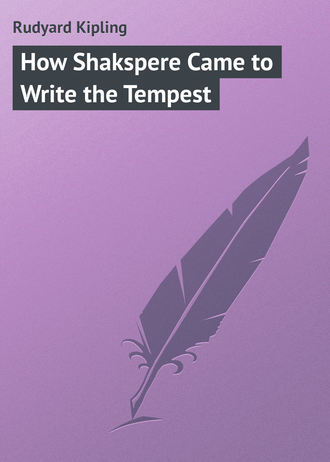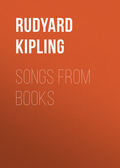
Редьярд Джозеф Киплинг
How Shakspere Came to Write the Tempest
But this was to be a play as well as a show, and must have some kind of plot. Perhaps he found an Italian novella with the story. No one has been able to find it since then. But stories somewhat similar to that of the ‘Tempest’ occur in a Spanish tale and in a German play. There was indeed a real Alfonso, king of Naples, and a duke of Milan who was dispossesst, and another named Prospero. But whatever story Shakspere found, it is my notion that he forgot most of it. The palace intrigues, the rivalries of the banisht and usurping dukes, set at naught by the love at first sight of their children, the perilous adventures, and the dénouement brought about by magic, were commonplaces of fiction. Shakspere wanted to weld them into a more surprising fable.
Perhaps it was at the very moment when he was most intent on this problem that the sailor from the fleet of Sir Thomas Gates hove into view. Even the mariner’s ballast of facts did not quite suffice. As Shakspere wrote he recalled some lines from his old favorite Ovid to fill out one of Prospero’s descriptions; and he used the newly-read Montaigne for Gonzalo’s account of a Utopian commonwealth. And some fine lines from Sir William Alexander’s tragedy of ‘Darius’ seem to have lingered in his recollection when he wrote of the great globe which is like a pageant and life that is like a dream. As he wrote of Prospero he thought too of his own career, of his own so potent art, of his promised retirement, and the fading pageants of both life and art.
Perhaps, too, he may have thought of some of his battles of wit with Ben Jonson in the Mermaid Tavern. Ben was a great stickler for the rules, though he lamented that the Unity of Time was very difficult to secure on the English stage. He thought masques should be kept distinct from comedies, and he had no liking for fantastic medleys. Indeed, a few years later he indulged in a scoff at Shakspere’s “servant-monster” and at “those who beget tales, tempests, and such like drolleries.” Shakspere, recalling some such discussion may have said to himself, “Well, here is a play as fantastic as possible, and just to show Benjamin what can be done, I will keep it in strict accord with his classical Unities of Time and Place.” For this or some other propose he was for once at great pains to keep all the action within the time of the stage-performance, tho in doing so he makes his one nautical error by forgetting that the seaman’s measure of time was a half-hour glass. When Prospero first consults Ariel we are precisely told that it is two o’clock in the afternoon, and just before the end of the drama we are told that three hours have elapst.
It has taken me too long to enumerate some of the materials in addition to those of Mr. Kipling’s sailor with which Shakspere’s fantasy worked. I hope I may have suggested that almost always, as here in this extraordinary flight of his imagination, he was writing as a playwright and not without full use of the hints and opportunities which the contemporary theater afforded. And I should like to suggest also that to the playwrights of that theater there were open many and great opportunities. Sailors home from a new world might cross the threshold of the dramatist; and dramatists then could think of magicians and monsters and fairies, of goddesses and drunken boors, of ideal commonwealths, the three unities, and beautiful verse, all in terms of the stage. Thru some such processes as have been rehearst, by some such influences, Shakspere’s imagination must have been led to the construction of a spectacular play that would win applause both in the Blackfriars playhouse and at court. Perhaps it is out of such varied driftwood that all enchanted islands are created.
Ashley H. Thorndike.(April 23, 1916).
How Shakspere Came to Write the ‘Tempest’
To the Editor of the Spectator.
SIR: – Your article on ‘Landscape and Literature’ in the Spectator of June 18th has the following, among other suggestive passages: – “But whence came the vision of the enchanted island in the ‘Tempest’? It had no existence in Shakspere’s world, but was woven out of such stuff as dreams are made of.”
May I cite Malone’s suggestion connecting the play with the casting away of Sir George Somers on the island of Bermuda in 1609; and further may I be allowed to say how it seems to me possible that the vision was woven from the most prosaic material – from nothing more promising in fact, than the chatter of a half-tipsy sailor at a theater? Thus:
A stage-manager, who writes and vamps plays, moving among his audience, overhears a mariner discoursing to his neighbor of a grievous wreck, and of the behavior of the passengers, for whom all sailors have ever entertained a natural contempt. He describes, with the wealth of detail peculiar to sailors, measures taken to claw the ship off a lee-shore, how helm and sails were workt, what the passengers did and what he said. One pungent phrase – to be rendered later into:
‘What care these brawlers for the name of King?’
– strikes the manager’s ear, and he stands behind the talkers. Perhaps only one-tenth of the earnestly delivered, hand-on-shoulder sea talk was actually used of all that was automatically and unconsciously stored by the island man who knew all inland arts and crafts. Nor is it too fanciful to imagine a half-turn to the second listener as the mariner, banning his luck as mariners will, says there are those who would not give a doit to a poor man while they will lay out ten to see a raree-show, – a dead Indian. Were he in foreign parts, as he now is in England, he could show people something in the way of strange fish. Is it to consider too curiously to see a drink ensue on this hint (the manager dealt but little in his plays with the sea at first hand, and his instinct for new words would have been waked by what he had already caught), and with the drink a sailor’s minute description of how he went across the reefs to the island of his calamity, – or islands rather, for there were many? Some you could almost carry away in your pocket. They were sown broadcast like – like the nut-shells on the stage there.
“Many islands, in truth,” says the manager patiently, and afterwards his Sebastian says to Antonio:
I think he will carry the island home in his pocket and give it to his son for an apple.
To which Antonio answers:
And sowing the kernels of it in the sea, bring forth more islands.
“But what was the island like?” says the manager. The sailor tries to explain. “It was green, with yellow in it; a tawny-colored country” – the color, that is to say, of the coral-beached, cedar-covered Bermuda of to-day – “and the air made one sleepy, and the place was full of noises” – the muttering and roaring of the sea among the islands and between the reefs – “and there was a sou’-west wind that blistered one all over.” The Elizabethan mariner would not discriminate finely between blisters and prickly heat; but the Bermudian of to-day will tell you that the sou’-west or Lighthouse wind in summer brings that plague and general discomfort. That the coral rock, battered by the sea, rings hollow with strange sounds, answered by the winds in the little cramped valleys, is a matter of common knowledge.





